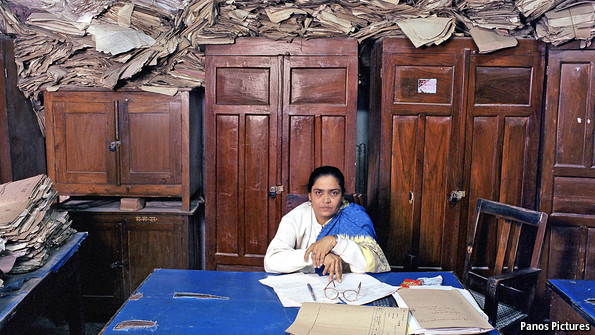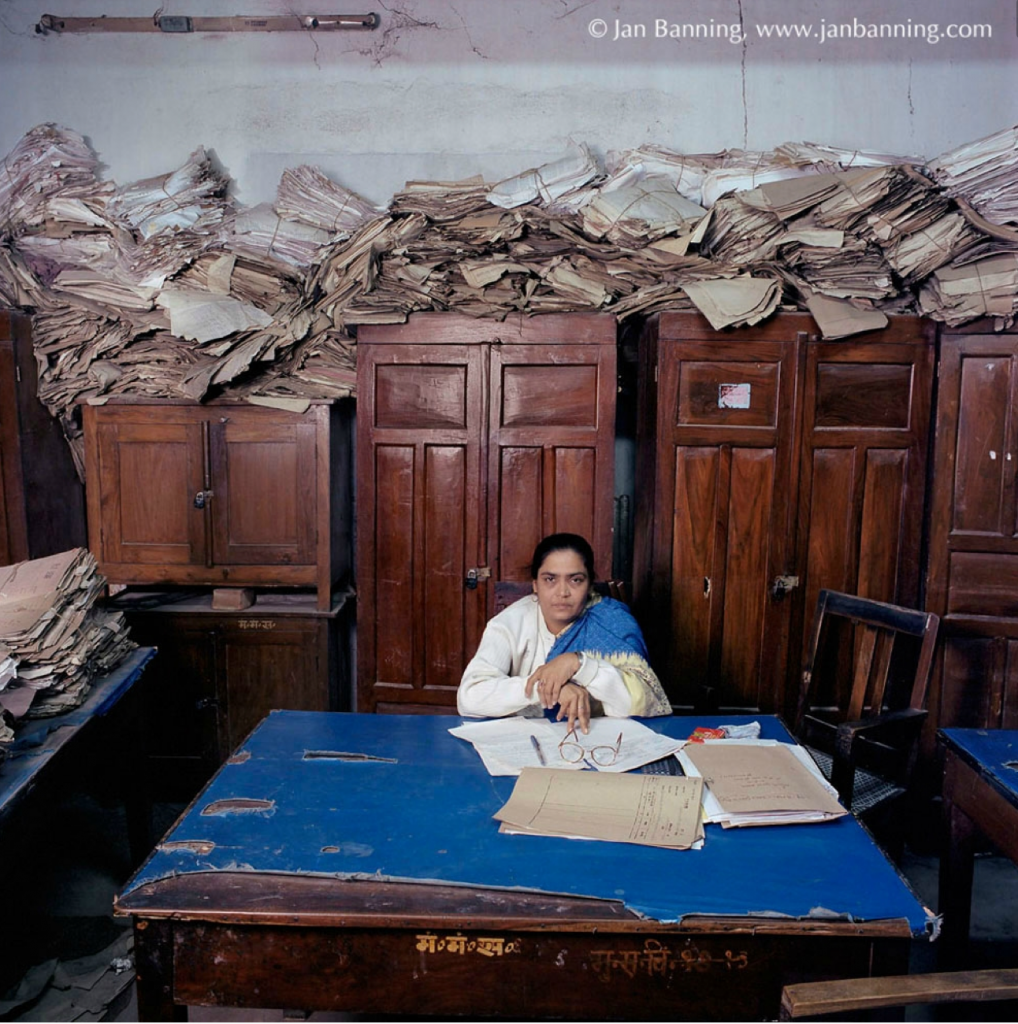Governments play a central role in facilitating economic development. Yet while economists have long emphasized the importance of government quality, historically they have paid less attention to the internal workings of the state and the individuals who provide the public services.
This paper reviews a nascent but growing body of field experiments that explores the personnel economics of the state.
To place the experimental findings in context, we begin by documenting some stylized facts about how public sector employment differs from that in the private sector. In particular, we show that in most countries throughout the world, public sector employees enjoy a significant wage premium over their private sector counterparts.
Moreover, this wage gap is largest among low-income countries, which tends to be precisely where governance issues are most severe. These differences in pay, together with significant information asymmetries within government organizations in low-income countries, provide a prima facie rationale for the emphasis of the recent field experiments on three aspects of the state–employee relationship: selection, incentive structures, and monitoring. We review the findings on all three dimensions and then conclude this survey with directions for future research.
A new paper titled “The Personnel Economics of the State”, Fred Finan, Ben Olken, and Rohini Pande. This confirms my belief that bureaucracy-building will be one of the most important topics of the next decade.
But I guess bureaucracy sounded too sexy so they decided to go with “Personnel Economics of the State”.
The photo is from an amazing series call Bureaucratics by Jan Banning.



88 Responses
You are right. That is why most underdeveloped nations like Africa are subject to abject poverty due to inefficiency of the government to play vital role in economy development. So they can abtain development..
Taken Nigeria as a case study. They have so many human and materials resources. Yet the poverty rate is alarming.
RT @planetmoney: “Bureaucracy-building will be one of the most important topics of the next decade.” @cblatts https://t.co/oT7CyViVSL https…
RT @cblatts: IMO this is one of the most important and interesting research frontiers in political economy https://t.co/dqnKvb3rf2
Bureaucracy is so hot right now, says @cblatts of new Finan, Olken, Pande paper https://t.co/JwFucU08Km
RT @cblatts: IMO this is one of the most important and interesting research frontiers in political economy https://t.co/dqnKvb3rf2
RT @planetmoney: “Bureaucracy-building will be one of the most important topics of the next decade.” @cblatts https://t.co/oT7CyViVSL https…
RT @Nicolas_Ajz: Interesados en research sobre public service, bureacracy, etc. Muy lindo paper este https://t.co/8vrrwFhMdz @martinkalos @…
Interesados en research sobre public service, bureacracy, etc. Muy lindo paper este https://t.co/8vrrwFhMdz @martinkalos @arisetton
Bureaucracy is so hot right now https://t.co/CJolyjamrJ
RT @planetmoney: “Bureaucracy-building will be one of the most important topics of the next decade.” @cblatts https://t.co/oT7CyViVSL https…
RT @planetmoney: “Bureaucracy-building will be one of the most important topics of the next decade.” @cblatts https://t.co/oT7CyViVSL https…
https://t.co/Leg4FO1WZm
RT @robert_a_blair: “Worldwide, public sector employees enjoy a significant wage premium over their private sector counterparts” https://t.…
RT @RachelStrohm: .@cblatts says studying bureaucracy is next step in understanding state capacity — surely @mollyshewrote agrees! https:/…
@rachelstrohm @cblatts @mollyshewrote
amazingly obvious
.@cblatts says studying bureaucracy is next step in understanding state capacity — surely @mollyshewrote agrees! https://t.co/OfIDT576t8
RT @planetmoney: “Bureaucracy-building will be one of the most important topics of the next decade.” @cblatts https://t.co/oT7CyViVSL https…
RT @planetmoney: “Bureaucracy-building will be one of the most important topics of the next decade.” @cblatts https://t.co/oT7CyViVSL https…
Bureaucracy is so hot right now https://t.co/bChZAihtao
RT @Noahpinion: Economists should *definitely* be doing more research into what makes a bureaucracy effective. HUGELY neglected. https://t.…
RT @planetmoney: “Bureaucracy-building will be one of the most important topics of the next decade.” @cblatts https://t.co/oT7CyViVSL https…
Bureaucracy essential to state functioning & now a “hot research topic”. Economists MIA for last 50 yrs?https://t.co/d1hEgO8H36
RT @planetmoney: “Bureaucracy-building will be one of the most important topics of the next decade.” @cblatts https://t.co/oT7CyViVSL https…
RT @planetmoney: “Bureaucracy-building will be one of the most important topics of the next decade.” @cblatts https://t.co/oT7CyViVSL https…
RT @planetmoney: “Bureaucracy-building will be one of the most important topics of the next decade.” @cblatts https://t.co/oT7CyViVSL https…
RT @planetmoney: “Bureaucracy-building will be one of the most important topics of the next decade.” @cblatts https://t.co/oT7CyViVSL https…
Can you please identify the photo in the article? @planetmoney @cblatts
RT @planetmoney: “Bureaucracy-building will be one of the most important topics of the next decade.” @cblatts https://t.co/oT7CyViVSL https…
RT @planetmoney: “Bureaucracy-building will be one of the most important topics of the next decade.” @cblatts https://t.co/oT7CyViVSL https…
RT @planetmoney: “Bureaucracy-building will be one of the most important topics of the next decade.” @cblatts https://t.co/oT7CyViVSL https…
RT @planetmoney: “Bureaucracy-building will be one of the most important topics of the next decade.” @cblatts https://t.co/oT7CyViVSL https…
RT @planetmoney: “Bureaucracy-building will be one of the most important topics of the next decade.” @cblatts https://t.co/oT7CyViVSL https…
“Bureaucracy-building will be one of the most important topics of the next decade.” @cblatts https://t.co/oT7CyViVSL https://t.co/c9FIWXamDT
Bureaucracy is so hot right now: Governments play a central role in facilitating economic development. Yet whi… https://t.co/lFcvLBJNil
RT @cblatts: IMO this is one of the most important and interesting research frontiers in political economy https://t.co/dqnKvb3rf2
RT @PCMagalhaes: “Bureaucracy is so hot right now” https://t.co/fnZmndrZrM
RT @Noahpinion: Economists should *definitely* be doing more research into what makes a bureaucracy effective. HUGELY neglected. https://t.…
government bureaucracy is so hot right now https://t.co/Ygvpj7riYj
RT @cblatts: IMO this is one of the most important and interesting research frontiers in political economy https://t.co/dqnKvb3rf2
“Bureaucracy is so hot right now” https://t.co/fnZmndrZrM
RT @drfarls: Bureaucracy is so hot right now https://t.co/Uc16yMZHzS
RT @drfarls: Bureaucracy is so hot right now https://t.co/Uc16yMZHzS
RT @Noahpinion: Economists should *definitely* be doing more research into what makes a bureaucracy effective. HUGELY neglected. https://t.…
Bureaucracy is so hot right now https://t.co/Uc16yMZHzS
RT @cblatts: IMO this is one of the most important and interesting research frontiers in political economy https://t.co/dqnKvb3rf2
“Worldwide, public sector employees enjoy a significant wage premium over their private sector counterparts” https://t.co/X3LwSCpsuW
Bureaucracy is so hot right now https://t.co/gjVBO0FqfH
RT @Noahpinion: Economists should *definitely* be doing more research into what makes a bureaucracy effective. HUGELY neglected. https://t.…
RT @Noahpinion: Economists should *definitely* be doing more research into what makes a bureaucracy effective. HUGELY neglected. https://t.…
Here’s a paper for your collection: http://www.kysq.org/pubs/LISTCh14.pdf
Burocracia https://t.co/ypwmNJPMb0 vía @cblatts https://t.co/Qw0OIsjna9 https://t.co/38Wjayjksx
public sector employees enjoy a significant wage premium over their private sector counterparts. https://t.co/Qw0OIsjna9
RT @cblatts: IMO this is one of the most important and interesting research frontiers in political economy https://t.co/dqnKvb3rf2
Qué manía de crear jergainnecesaria. A la burocracia en economiqués se le llama “Personnel Economics of the State” https://t.co/HUv8Bjn7ZO
RT @Noahpinion: Economists should *definitely* be doing more research into what makes a bureaucracy effective. HUGELY neglected. https://t.…
RT @Noahpinion: Economists should *definitely* be doing more research into what makes a bureaucracy effective. HUGELY neglected. https://t.…
RT @Noahpinion: Economists should *definitely* be doing more research into what makes a bureaucracy effective. HUGELY neglected. https://t.…
RT @Noahpinion: Economists should *definitely* be doing more research into what makes a bureaucracy effective. HUGELY neglected. https://t.…
Photo is also used as the cover image for an excellent ethnographic account byGupta @cblatts https://t.co/YbJp5bBIrh https://t.co/U5QozubAxL
RT @Noahpinion: Economists should *definitely* be doing more research into what makes a bureaucracy effective. HUGELY neglected. https://t.…
Bureaucracy is sexy, baby. https://t.co/UkcYDSzI9v
RT @cblatts: IMO this is one of the most important and interesting research frontiers in political economy https://t.co/dqnKvb3rf2
“Bureaucracy is so hot right now” by @cblatts https://t.co/jZQAxU9unX
RT @cblatts: IMO this is one of the most important and interesting research frontiers in political economy https://t.co/dqnKvb3rf2
RT @Noahpinion: Economists should *definitely* be doing more research into what makes a bureaucracy effective. HUGELY neglected. https://t.…
RT @cblatts: IMO this is one of the most important and interesting research frontiers in political economy https://t.co/dqnKvb3rf2
“Bureaucracy is so hot right now” #international https://t.co/BULv9uhBeo
RT @Noahpinion: Economists should *definitely* be doing more research into what makes a bureaucracy effective. HUGELY neglected. https://t.…
RT @Noahpinion: Economists should *definitely* be doing more research into what makes a bureaucracy effective. HUGELY neglected. https://t.…
RT @Noahpinion: Economists should *definitely* be doing more research into what makes a bureaucracy effective. HUGELY neglected. https://t.…
RT @Noahpinion: Economists should *definitely* be doing more research into what makes a bureaucracy effective. HUGELY neglected. https://t.…
RT @cblatts: IMO this is one of the most important and interesting research frontiers in political economy https://t.co/dqnKvb3rf2
Bureaucracy is so hot right now via @cblatts https://t.co/0QMsrxwhqx
RT @Noahpinion: Economists should *definitely* be doing more research into what makes a bureaucracy effective. HUGELY neglected. https://t.…
RT @Noahpinion: Economists should *definitely* be doing more research into what makes a bureaucracy effective. HUGELY neglected. https://t.…
RT @Noahpinion: Economists should *definitely* be doing more research into what makes a bureaucracy effective. HUGELY neglected. https://t.…
RT @Noahpinion: Economists should *definitely* be doing more research into what makes a bureaucracy effective. HUGELY neglected. https://t.…
RT @Noahpinion: Economists should *definitely* be doing more research into what makes a bureaucracy effective. HUGELY neglected. https://t.…
RT @cblatts: IMO this is one of the most important and interesting research frontiers in political economy https://t.co/dqnKvb3rf2
RT @cblatts: IMO this is one of the most important and interesting research frontiers in political economy https://t.co/dqnKvb3rf2
RT @cblatts: IMO this is one of the most important and interesting research frontiers in political economy https://t.co/dqnKvb3rf2
RT @cblatts: IMO this is one of the most important and interesting research frontiers in political economy https://t.co/dqnKvb3rf2
RT @cblatts: IMO this is one of the most important and interesting research frontiers in political economy https://t.co/dqnKvb3rf2
@cblatts was surprised to read your comment about economist ignoring the internal issues involving bureaucracy since discussed by Econ Hist.
RT @cblatts: IMO this is one of the most important and interesting research frontiers in political economy https://t.co/dqnKvb3rf2
RT @cblatts: IMO this is one of the most important and interesting research frontiers in political economy https://t.co/dqnKvb3rf2
RT @cblatts: IMO this is one of the most important and interesting research frontiers in political economy https://t.co/dqnKvb3rf2
RT @cblatts: IMO this is one of the most important and interesting research frontiers in political economy https://t.co/dqnKvb3rf2